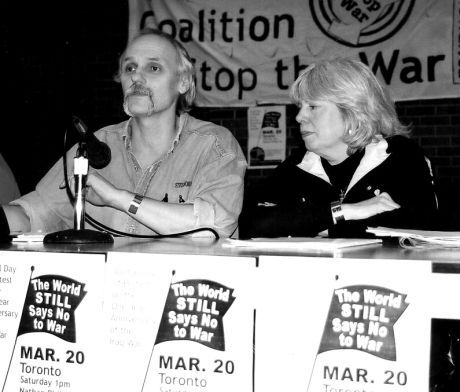Features
You are here
Military Families Speak Out: an inspiring anti-war legacy

November 2, 2013
In November 2002, just months before the U.S.-led invasion of Iraq, two families came together to found what was to become a key anti-war voice in the United States. Military Families Speak Out (MFSO), which grew to 4,000 families, revealed the depth of anti-war sentiment in US society, and helped to broaden and strengthen that sentiment. Now, after a decade of organizing, MFSO is winding down its work. By the end of 2013, the organization will fold. It is important to mark MFSO's many achievements, and also to learn from the example provided by over a decade of resistance to war.
MFSO gave a voice to the spouses, parents, children and loved ones of US military personnel in the lead-up to the launch of the Iraq War. The mantra of "Support Our Troops" was used by the Bush administration to silence opposition to the illegal invasion of Iraq. By giving military families who opposed the war a collective voice, MFSO punched through the pro-war propaganda to show how troops were being sent to kill or to die for a war based on lies.
War resisters
By the time of the Iraq invasion, MFSO chapters were springing up across the US. Gold Star Families for Peace (the families of soldiers killed in war) eventually formed their own chapter and spoke out in the media and at rallies.
Charley Richardson and Nancy Lessin were the driving force in establishing MFSO. They had a son in the US military. Charley and Nancy brought their experience as long-time trade-union activists and organizers to the task of drawing together families from diverse regions and backgrounds. This was no easy task. They overcame many obstacles, and gave confidence and focus to those they worked alongside.
When Iraq Veterans Against the War was founded in July 2004 at the national Veterans for Peace convention in Boston, Nancy Lessin stated, “You more than anyone else know what our loved ones go through. Bush lied and who died? Nine hundred of our soldiers and thousands of Iraqis.”
MFSO's slogan, "Support our troops, bring them home now, and take care of them when they get here", galvanized thousands of military family members and exposed the "ground truth" of the wars in Iraq and Afghanistan: veterans afflicted with visible and invisible wounds, the draining of public resources for wars of agression, the gutting of VA services and a rising number of suicides. It is estimated that one veteran commits suicide every 65 minutes in the US—an average of 22 suicides per day.
MFSO also played an important role in supporting US soldiers who sought asylum in Canada after refusing to participate in the Iraq War. They provided advice and support to the War Resisters Support Campaign, and were invaluable allies of anti-war activists in Canada. MFSO members met many times with US war resisters in Toronto, and spoke on several panels with them.
In a 2006 speech, Charley Richardson said: "Politicians learned a very important lesson from the Vietnam War: isolate and hide the impact of the war, hide it from the people you're supposedly answerable to, limit the impact to people who have less power in society—and most of all, don't even pretend to threaten the sons and daughters of the well-off with service. Now, they use the economic draft—they draft the National Guard that belongs at home, they use the 'stop-loss' draft… These chicken hawk bastards who never served, whose children are not serving, find it so easy to send our loved ones off to die."
This sums up well what motivated the many thousands of members of MFSO to speak out against these wars over the past decade.
Obama and economic crisis
In 2009, following Barack Obama's election, MFSO, VFP and IVAW issued a joint open letter to the anti-war movement, titled "Our Troops and Iraqis Are Still Dying"—calling for sustained mobilization. It read:
"President Obama has announced a plan to gradually reduce troop levels in Iraq. Many in the peace/anti-war movements are breathing a sigh of relief, and suggesting that it is time for us to scale back our efforts to bring an end to the occupation of Iraq. But for our troops on the ground, their families and the Iraqi people, the nightmare continues. They need all of us to stay in the struggle."
A number of factors contributed to the recent decision to wind down the organization. As the MFSO website explains, "Politically, MFSO thrived as an important part of a vibrant anti-war movement during the height of the Iraq War. The organization grew to include opposing the war in Afghanistan, but as the anti-war movement struggled to maintain resources and momentum after the election of Barack Obama, so too did MFSO."
With the economic crisis, many activists shifted their focus to jobs, economic inequality, and other issues.
Another factor which undoubtedly affected the organization was Charley Richardson's death on May 4 of this year. MFSO bore the imprint of Charley's belief in the ability of ordinary people to change the world. That vision was embodied in the experiences that MFSO members related, and in the impact their stories had on the world around them. This legacy will offer inspiration to the ongoing fight against unjust and brutal wars.
Section:









